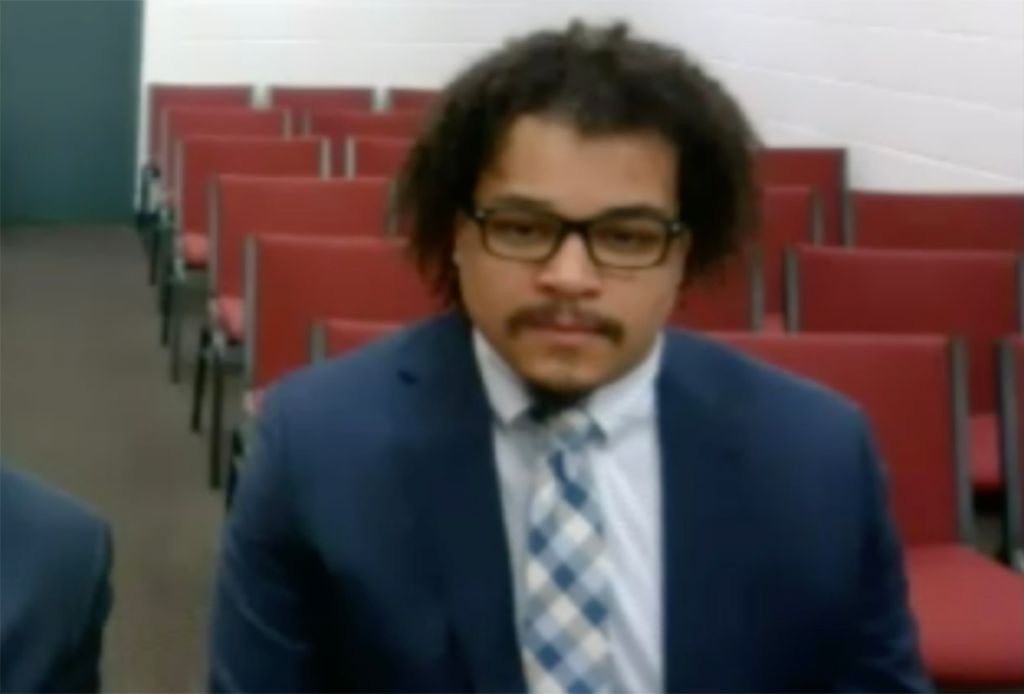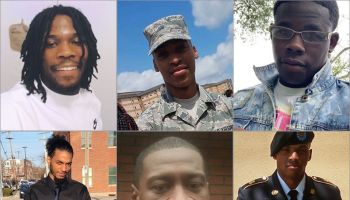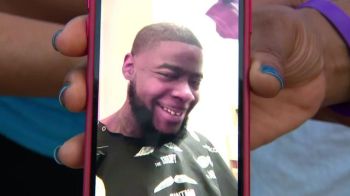
William Marcus “Marc” Wilson at a hearing on Jan. 25, 2022. | Source: Bulloch County Courtroom
The legal team for a Black man convicted this week of involuntary manslaughter in Georgia is using no uncertain terms to describe what they claim is a miscarriage of justice on numerous levels in a murder trial that centered on race.
William Marcus “Marc” Wilson was on Wednesday acquitted of the most serious charges more than two years after he killed a 17-year-old white girl in a purported self-defense shooting with a legally owned gun stemming from an encounter on a Statesboro road that was alleged to have been motivated by anti-Black racism.
An appeal has already been planned as lawyers turn their attention to Wilson’s pending sentencing hearing later this month.
In a press conference on Thursday, his lawyers and other advocates said the trial’s judge never instructed the jury — made up of 11 white people and one African American — to consider a misdemeanor manslaughter charge. That absence was indicative of what defense attorney Francys Johnson said he recognized from the outset of the case as being “a legal lynching.”
Johnson emphasized that Wilson was acquitted and found not guilty on every single charge he was facing, including one count of felony murder and one count of aggravated assault in the death of Haley Hutcheson.
Johnson said that means Wilson “didn’t use his weapon in a way that was unlawful” and thus should not have been convicted of any crime.
Johnson noted that “the discretion we allow judges” permits adding lesser offenses “at the last minute.” However, Johnson added, not including the misdemeanor manslaughter charge meant that “this jury was confused and in our opinion produced a legal error.”
Because Wilson was acquitted on all the charges he faced going into the trial, Johnson said there isn’t a legal justification for the manslaughter conviction.
“There is no felony to predicate this involuntary manslaughter charge,” Johnson emphasized on Thursday, echoing his comments he made to reporters immediately following the verdict:
“If that option had been included as we asked and insisted, this jury would have found Marc guilty of the misdemeanor version of manslaughter and Marc would be coming home,” Johnson said Wednesday outside of the courthouse.
The Rev. James “Major” Woodall, a public policy associate of the Southern Center for Human Rights and former State President of the Georgia NAACP who was a constant presence in the courtroom for Wilson’s trial which lasted less than two weeks, also referred to the verdict as a “lynching” and blamed overzealous prosecutors.
“The Bulloch Co. District Attorney’s Office, led by Daphne Totten, just committed a lynching,” Woodall tweeted shortly after the verdict was delivered.
On Thursday, Johnson built on Woodall’s sentiment by claiming the Bulloch County District Attorney’s Office is “drunk with power” in an effort “to lock people up, particularly poor white and Black people.”
As proof of his claim, Johnson pointed to what he said were misdemeanor charges against people in the truck that are “still pending more than two years later.” He suggested the DA’s office has allowed those separate cases against white people to languish “just to try to get a conviction” in Wilson’s case.
Wilson, who had been held without bond for more than 600 days leading up to the trial, was facing life in prison if convicted of all charges. State sentencing guidelines recommend a prison sentence of anywhere from one to 10 years for an involuntary manslaughter conviction. However, considering Wilson was already behind bars for what Johnson said was two-and-a-half years, he is arguing for whatever sentence is imposed to exclude more time behind bars.
A 21-year-old Wilson was arrested more than two years ago for the fatal shooting at a “truckload of belligerent racists” trying to run him off the road, his lawyers maintained in the case. The pursuing pickup truck carried white people yelling racial slurs at Wilson and his girlfriend, who is white, defense lawyers said. Wilson, who was legally permitted to carry the weapon he used to defend himself, argued that he should never have been charged for what his lawyers described as an unfortunate consequence of self-defense on June 14, 2020.
During the trial, Wilson’s mother took the stand and testified that her son said his alleged assailants spewed racist death threats during the encounter.
“‘N*gger, your life doesn’t matter,’ ‘I was going to die.’ They said, ‘I’m going to kill you,” Amanda Wilson, who is white, claimed under oath.
Wilson’s girlfriend offered testimony that was consistent with initial reports that he fired off a warning shot after they felt threatened by the pickup truck while out for a late-night trip to a fast-food restaurant.
“… the truck started swerving into our lane, they started, you know, going up and like coming back but stayed right there with us,” Emma Rigdon testified through tears. “I remember going on the rumble strips, and that’s whenever Marc shot to kind of say, ‘Hey, like leave us alone.’ We just wanted to go get food.”
However, Rigdon did not corroborate the defense’s claims that racist language was being shouted from the truck. When asked by the prosecution whether she heard any racist slurs, Rigdon responded simply, “I didn’t hear any,” and claims she was distracted by “other things.”
Johnson said prosecutors “twisted her words” and suggested Rigdon was “the victim of a crime, too.”
Ahead of his trial, Wilson was repeatedly denied bail and ultimately spent more than two years behind bars in part because of the COVID-19 pandemic disrupting the court’s schedule in addition to subsequent questions regarding a judge presiding over the case.
When Wilson’s defense counsel discovered that Judge Michael Muldrew and DA Totten had improper communication during the trial, for example, “they attempted to cover it up without notifying the defense, giving the appearance of judicial impropriety,” Woodall wrote in an op-ed for NewsOne that was published last year. “The district attorney submitted evidence to the judge never shared with Wilson’s defense. And when it was brought to the court’s attention by the defense team, Muldrew held Wilson’s lead defense counsel, Attorney Francys Johnson, in contempt of court.”
Muldrew was ultimately forced to recuse himself after Senior Judge Michael L. Karpf issued a seven-page order in February. But the ruling did not make a finding of bias or inappropriate conduct from the removed judge and instead found that there could be an appearance of bias against Wilson or his attorneys.
“While the court does not ascribe actual bias or prejudice by the trial judge against defendant or his counsel, the series of events outlined above do create such an appearance,” Karpf wrote.
Recounting the incident that gave rise to the request for recusal, Karpf noted that the prosecutor handed a notebook with evidence to Muldrew that had never been given to the defense team during the discovery process. The notebook was handed back to the defense by mistake, prompting Wilson’s lead attorney Johnson to request the clerk take possession of the notebook to “preserve a chain of custody.”
That led to Johnson being found in contempt and detained. During a conversation with Johnson’s co-counsel, Muldrew claimed that he had several lawyers express “concern about the quality of representation afforded to defendant.”
Karpf found conversations with lawyers outside of the case about the defense team’s performance “would constitute an extra-judicial communication suggestive of prejudice against trial counsel.”
Despite Muldrew’s claims that he received complaints about the defense’s handling of the case, over 100 lawyers signed a letter of support after Johnson was held in contempt.
“Young people like Wilson get dragged through the system with procedural delays and the broad realm of judicial and prosecutorial discretion standing in the way of just action,” Woodall also wrote in his op-ed for NewsOne. “Reasonable fear of Blackness is accepted, but Black people’s genuine fear of severe bodily injury or death is often disregarded.”
SEE ALSO:
Black Driver Charged With Murdering One Of The ‘Racists’ Attacking Him Stood His Ground, Lawyers Say

















